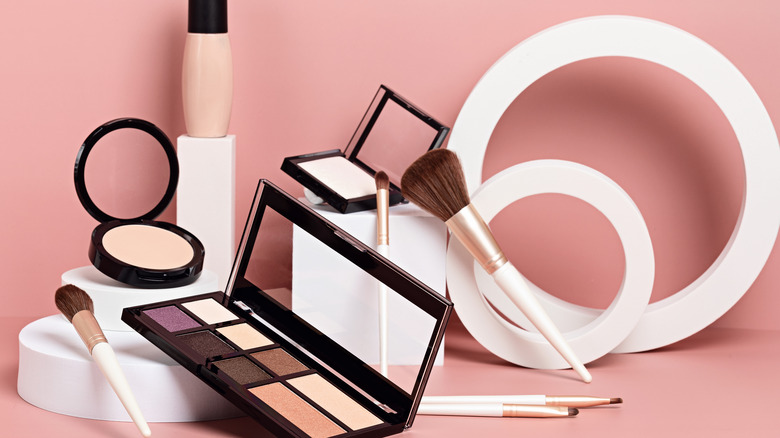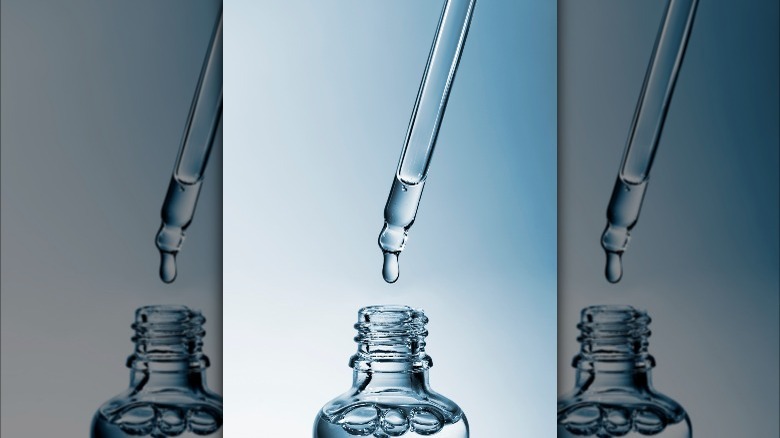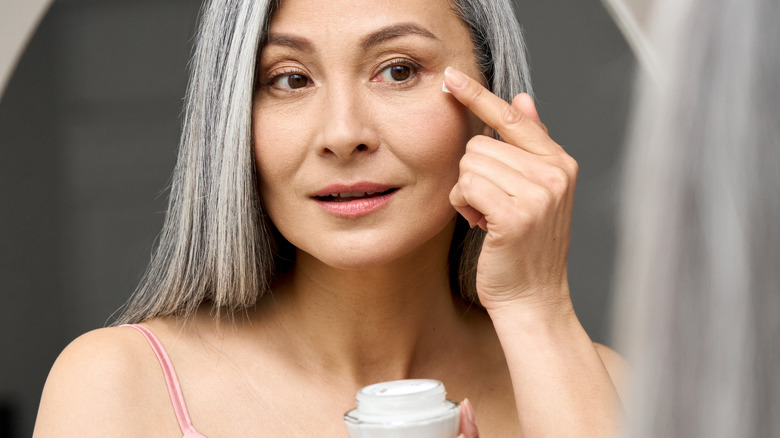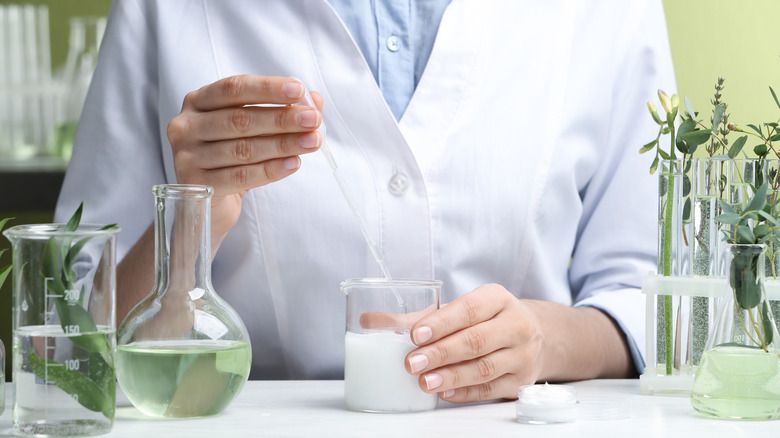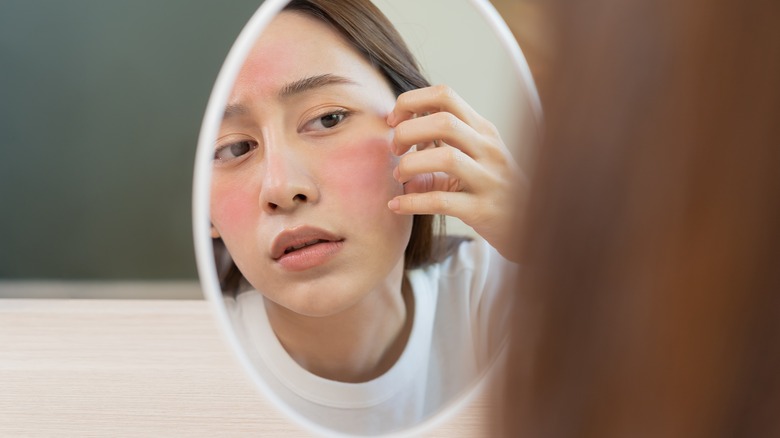What Is A Cosmeceutical?
Most of us know offhand what cosmetics are: makeup and other products you buy to care for your body, such as shampoo, makeup, exfoliating scrub, hair dye, nail polish or lotion. You might think of cosmetics as anything you apply to your skin or hair to maintain — or improve — your appearance (via MedlinePlus).
Meanwhile, pharmaceuticals are drugs, or products that incorporate an active ingredient a person would use to treat some sort of medical issue. This category includes both prescription and over-the-counter drugs like Tylenol.
Put the two terms together, and you get a cosmeceutical, or a cosmetic that incorporates an active ingredient intended to affect change in the body (via WebMD).
Although this combination of ideas seems straightforward enough, there are a lot of things to know about cosmeceuticals before you start adding any new products in this category to your self-care routine, including safety considerations and whether cosmeceuticals can really do what they claim.
What pharmaceuticals are
Going back to the origin of the term cosmeceutical, consumers need to understand that this category of products, although made up by a cosmetic and a pharmaceutical, is, technically, neither a cosmetic nor a pharmaceutical — at least not if you ask the United States government.
Most importantly, consumers should understand that pharmaceuticals are regulated by the U.S. Food & Drug Administration. So, if a company is seeking approval of a new drug — think the COVID-19 vaccine — it would need the FDA to review its product for safety and provide the go-ahead before marketing said drug to consumers.
There are several steps that must be taken before a drug or pharmaceutical would hit the shelves, including a clinical trial and a benefits versus risk analysis. But the bottom line is that when you, the consumer, purchase a pharmaceutical at CVS or your local grocery store, or you pick up a prescription, you can do so with the confidence that the product has endured rigorous oversight.
It's important to note that dietary supplements do not require FDA approval — this category would include herbal supplements, vitamins and minerals sold as pills or gummies for instance.
Of course, now you're probably wondering what the Food & Drug Administration's role is when it comes to the sale of cosmetics.
What cosmetics are
In short, when you buy a cosmetic product like shampoo, it has been regulated by the FDA. The organization's most important role here is to ensure that packaging and claims made on the label are true. So, if a shampoo is going to purport to help you live longer, that claim wouldn't fly.
Ingredients in products in this category do not need FDA approval, however, with the exception of color additives. That said, a cosmetics company cannot knowingly use a poisonous ingredient in its product. A good example of this is Johnson & Johnson's Baby Powder, which no longer incorporates talc following the headline-making lawsuit that alleged this ingredient causes cancer (via The New York Times).
To boil it down: When you purchase a cosmetic like a body lotion, the packaging and labeling is regulated by the FDA. Ingredients are not, except any color additives.
But sometimes things can get a little confusing as to whether a product is a cosmetic or a drug.
There's no such thing as cosmeceuticals according to the FDA
According to the FDA, looking at a product's intended use is how the regulatory body determines if it's a cosmetic or a drug. The technical definition of cosmetic products are "articles intended to be rubbed, poured, sprinkled, or sprayed on, introduced into, or otherwise applied to the human body...for cleansing, beautifying, promoting attractiveness, or altering the appearance." So your lotions, perfumes, body powders, hairsprays, blush, eyeshadow, lipstick, soap, face wash, mascara and nail polish would all get lumped into this category.
Shifting gears, drugs, as defined by the FDA are "articles intended for use in the diagnosis, cure, mitigation, treatment, or prevention of disease." So you have your COVID-19 tests, yeast infection treatments, headache medicines and antibacterial ointments over in this category.
Now, let's get back to the synthesis of cosmetics and pharmaceuticals, which would be cosmetics that purport to provide a therapeutic solution, such as a body lotion that uses an active ingredient like retinol to provide anti-aging benefits (via WebMD). While killing two birds with one stone, er, product, sounds ideal, guess what? According to the FDA, the word cosmeceutical has "no meaning under the law."
Cosmeceuticals sure seem appealing
The idea that a cosmetic product could also offer a therapeutic benefit is undoubtedly appealing. Who wouldn't want to cover up pimples while also preventing new ones from forming? We're not saying products like this don't work or that you shouldn't buy them. But what you do need to know is that when a product is marketed as a so-called cosmeceutical, the FDA has not approved its claims.
"As far as the FDA is concerned, there is no provision for a cosmeceutical. A product is either regulated as a cosmetic or it's regulated as a drug, and where it falls all depends on the types of claims that are being made," cosmetic chemist Jim Hammer explained to WebMD.
Interestingly, a product can be both a cosmetic and a drug according to the FDA. The important distinction is simply that the body doesn't recognize the term cosmeceutical. So where does that leave us with what benefits these products may or may not provide?
Cosmeceuticals are still tested
The origin of the term cosmeceutical is attributed to Albert Kligman, a doctor who, in the 1980s, sought to describe skincare products that affect change to the skin in addition to beautification, according to Verywell Health. The outlet notes a very significant difference between a drug and a cosmetic product that offers therapeutic benefits. A drug treats a problem, while a cosmeceutical will provide an aesthetic result. So for instance, a soap that treats eczema is a drug while a cream that improves the look of fine lines is not a drug.These are important considerations when you evaluate a product. Again, it's not that cosmeceuticals don't work. It's that they are not going to act in the same way as a drug.
Clearly cosmeceutical products are going strong in the beauty industry, since entire companies have been built around the concept. One example is SkinCeuticals, which claims to have pioneered the entire industry of cosmeceuticals.
And just because the FDA doesn't recognize the category of cosmeceuticals doesn't mean the products haven't been subjected to rigorous testing (via WebMD). For instance, if a lotion purports to prevent aging, clinical trials may have very well proven that people saw age prevention benefits from using the product. In fact, dermatologists regularly recommend the use of products in this category. You may even have several cosmeceuticals in your medicine cabinet or bathroom drawer at this very moment.
How to know if cosmeceuticals are for you
As the National Library of Medicine notes, the term cosmeceutical is "controversial" and ever-evolving. So what's a consumer to do?
The bottom line on what cosmeceuticals are may be best explained by New York dermatologist Marina Peredo, who told WebMD that this is a marketing term and nothing more. So perhaps it's best not to let the word trip you up. No, the category is not recognized by the FDA. Yes, dermatologists are recommending these products each and every day. The effectiveness of the active ingredients in these products is proven, such as is the case of retinols and alpha-hydroxy acids.
But given that according to Healthline, using an active ingredient like retinol improperly can be dangerous, Beautiful With Brains makes a great recommendation: Only use a cosmeceutical at the advice of your dermatologist, and if you have sensitive skin, you may want to avoid a cosmeceutical that includes a large amount of an active ingredient like retinol all together. Adore Beauty also recommends incorporating a new cosmeceutical product into your beauty routine slowly, so you don't overstimulate your skin and wind up with more irritation than benefits.


